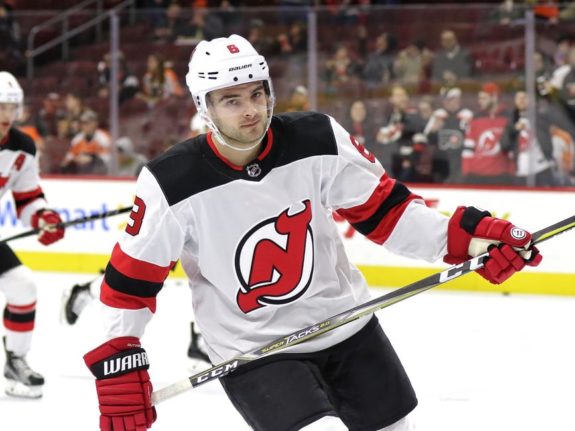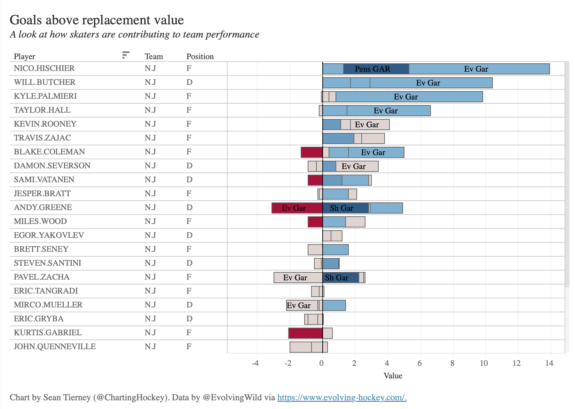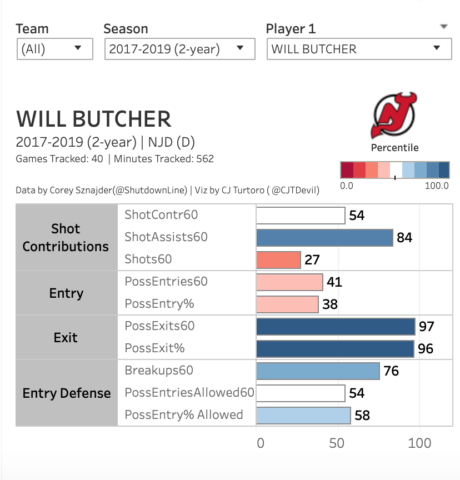Will Butcher is arguably the New Jersey Devils’ most important restricted free agent this summer. After opting to not sign with the Colorado Avalanche, the team who drafted him, he signed with the Devils in Aug. 2017 as a free agent. He made the NHL roster right away and had a stellar rookie season, finishing with 44 points in 81 games, and showing why he won the Hobey Baker Award in 2017.
Things didn’t go as smoothly in his second pro season. His counting totals took a step back as he finished with 30 points in 78 games. His underlying numbers also fell a bit, but they were still among some of the best on the team. General manager Ray Shero will have a decision to make on what kind of contract he gives Butcher. Has Butcher already proven himself at 24 years old to get a long-term deal? Or should Shero play it safe with a bridge deal?
Butcher Can Play at a High Level
It may seem like Butcher had a bad 2018-19, but that isn’t 100 percent true. His expected goals for percentage (xGF%) was 52.24 percent, ranked second to Ben Lovejoy, who was traded to the Dallas Stars at the trade deadline, while his high-danger chances for percentage (HDCF%) of 55.38 percent ranked first. That’s pretty impressive considering the Devils were awful this season.

It’s good to see that Butcher performed well on a bad team, but Shero won’t be basing his new deal off one season. If we expand Butcher’s numbers to include last season, he’s among some of the best in the NHL. Here’s how his Corsi for percentage (CF%), scoring chances for percentage (SCF%), HDCF%, and xGF% rank among 202 defensemen with at least 1000 minutes played at five-on-five:
- CF%: 51.42 percent (53rd)
- SCF%: 53.73 percent (23rd)
- HDCF%: 56.68 percent (8th)
- xGF%: 54.33 percent (19th)
Those numbers are quite good and put him in great company. His HDCF% is better than defensemen such as Jaccob Slavin, Victor Hedman, and Kris Letang. While his xGF% is ahead of Hedman, John Klingberg, and Brent Burns, to name a few.
If you’re still skeptical, another stat that’ll help is goals above replacement (GAR), which shows how many goals a player adds to a team relative to a replacement level player. Butcher’s GAR of 19.8 ranks him 21st in the league for defensemen with 1000 minutes played (all strengths) since the start of last season (via Evolving Hockey). His GAR this season alone has him as the Devils’ most valuable defenseman and second most valuable player.

Butcher’s analytics prove that he can play a high level, but the eye test does show there are some things he needs to work on. He’s not the fastest skater by any stretch, and at times, it’s a detriment. He’s never going to win the fastest skater competition, but it’s something he has to improve to be a consistent top-four defenseman.
He also needs to improve his shot, which has been a problem since last season. He’s unable to get his shot through traffic as often as he needs to, and it’s one of the reasons why Damon Severson took his spot on the first power play unit. Butcher was one of the top power play producers as a rookie in 2017-18, and the Devils could use him back at that level moving forward.
Why Shero Should Sign Butcher Long-Term
It’s clear the Devils have themselves a player in Butcher. There are things he can work on, but his numbers suggest he can be a second-pair defenseman. Given that, I think it’d be smart for Shero to sign him to a long-term contract. And there are a few reasons why that’d be the right move.
Related: Devils Win Draft Lottery and Hughes Sweepstakes
One reason is because of Butcher’s age. He’ll be 25 years old in January, so a bridge deal doesn’t make that much sense. A long-term deal of five to six years would eat up some UFA years and would have Butcher signed through the prime of his career.
Another reason to get Butcher locked up long-term is his ability to move the puck, something the Devils have struggled with. He may not be the fastest guy out there, but he exits the defensive zone with possession at a very high rate. Since the start of 2017, his possession exits per 60 minutes and possession exit percentage rank in the 97th and 96th percentiles, respectively. That’s incredibly valuable in today’s NHL.

Since we’ve established that Butcher should be locked up long-term, how much should he get paid? Severson, who has a six-year deal with a cap hit of $4.1 million, serves as a good comparison. Evolving Wild released their contract projections last week, and on a six-year deal, Butcher would come in with a cap hit just over $4.2 million. Subtract a year, and he’d come in with a cap hit of $4.1 million. That’s nearly identical to Severson and is a fair price for Butcher, too.
Related – Devils’ Pending RFAs: Crucial Decisions to be Made
Shero and Taylor Hall talked about adding more talent this summer. They aren’t in danger of losing Butcher, but getting him locked up long-term should be a priority. He’s a young, puck-moving defenseman, and those don’t grow on trees. He’s also part of a young defense core that includes Severson and top prospects Jeremy Davies and Ty Smith. Having Butcher signed for the next five to six years, along with those three, gives Shero a nice blue line to build around. And if they want to be contenders, it’s a move that has to be made.
* * *
Advanced stats from Natural Stat Trick except where noted